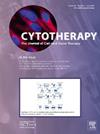Mesenchymal stromal cells can block palmitate training of macrophages via cyclooxygenase-2 and interleukin-1 receptor antagonist
IF 3.7
3区 医学
Q2 BIOTECHNOLOGY & APPLIED MICROBIOLOGY
引用次数: 0
Abstract
Innate training of macrophages can be beneficial for the clearance of pathogens. However, for certain chronic conditions, innate training can have detrimental effects due to an excessive production of pro-inflammatory cytokines. Obesity is a condition that is associated with a range of increased pro-inflammatory training stimuli including the free fatty acid palmitate. Mesenchymal stromal cells (MSCs) are powerful immunomodulators and known to suppress inflammatory macrophages via a range of soluble factors. We show that palmitate training of murine bone-marrow-derived macrophages and human monocyte-derived macrophages (MDMs) results in an increased production of TNFα and IL-6 upon stimulation with lipopolysaccharide and is associated with epigenetic remodeling. Palmitate training led to metabolic changes, however, MSCs did not alter the metabolic profile of human MDMs. Using a transwell system, we demonstrated that human bone marrow MSCs block palmitate training in both murine and human macrophages suggesting the involvement of secreted factors. MSC disruption of the training process occurs through more than one pathway. Suppression of palmitate-enhanced TNFα production is associated with cyclooxygenase-2 activity in MSCs, while secretion of interleukin-1 receptor antagonist by MSCs is required to suppress palmitate-enhanced IL-6 production in MDMs.
间充质基质细胞可通过环氧化酶-2 和白细胞介素-1 受体拮抗剂阻止巨噬细胞的棕榈酸酯训练。
对巨噬细胞进行先天训练有利于清除病原体。然而,对于某些慢性疾病,先天性训练可能会因过度产生促炎细胞因子而产生有害影响。肥胖症与一系列促炎训练刺激物的增加有关,其中包括游离脂肪酸棕榈酸酯。间充质基质细胞(MSCs)是一种强大的免疫调节剂,可通过一系列可溶性因子抑制炎性巨噬细胞。我们的研究表明,对小鼠骨髓衍生巨噬细胞和人类单核细胞衍生巨噬细胞(MDMs)进行棕榈酸酯训练,可在脂多糖刺激下增加 TNFα 和 IL-6 的产生,并与表观遗传重塑有关。棕榈酸酯训练会导致新陈代谢的变化,然而间充质干细胞并不会改变人MDMs的新陈代谢特征。我们利用透孔系统证明,人骨髓间充质干细胞能阻断鼠和人巨噬细胞的棕榈酸酯训练,这表明分泌因子的参与。间充质干细胞对训练过程的破坏不止通过一种途径。抑制棕榈酸酯增强的TNFα的产生与间充质干细胞中环氧化酶-2的活性有关,而间充质干细胞分泌白细胞介素-1受体拮抗剂是抑制棕榈酸酯增强的MDM中IL-6的产生所必需的。
本文章由计算机程序翻译,如有差异,请以英文原文为准。
求助全文
约1分钟内获得全文
求助全文
来源期刊

Cytotherapy
医学-生物工程与应用微生物
CiteScore
6.30
自引率
4.40%
发文量
683
审稿时长
49 days
期刊介绍:
The journal brings readers the latest developments in the fast moving field of cellular therapy in man. This includes cell therapy for cancer, immune disorders, inherited diseases, tissue repair and regenerative medicine. The journal covers the science, translational development and treatment with variety of cell types including hematopoietic stem cells, immune cells (dendritic cells, NK, cells, T cells, antigen presenting cells) mesenchymal stromal cells, adipose cells, nerve, muscle, vascular and endothelial cells, and induced pluripotential stem cells. We also welcome manuscripts on subcellular derivatives such as exosomes. A specific focus is on translational research that brings cell therapy to the clinic. Cytotherapy publishes original papers, reviews, position papers editorials, commentaries and letters to the editor. We welcome "Protocols in Cytotherapy" bringing standard operating procedure for production specific cell types for clinical use within the reach of the readership.
 求助内容:
求助内容: 应助结果提醒方式:
应助结果提醒方式:


